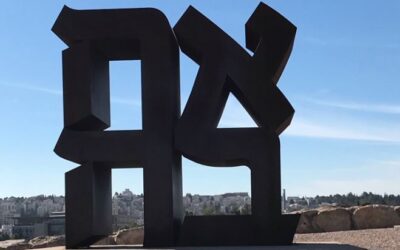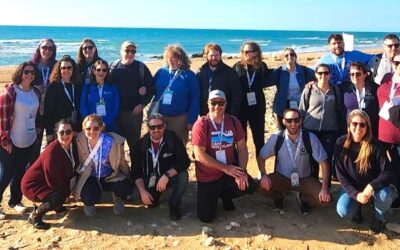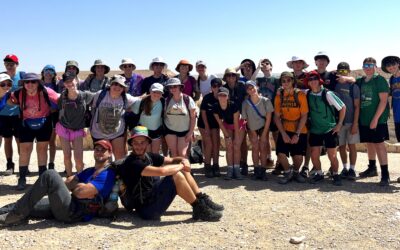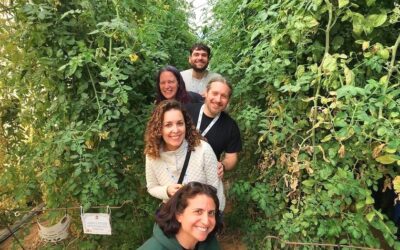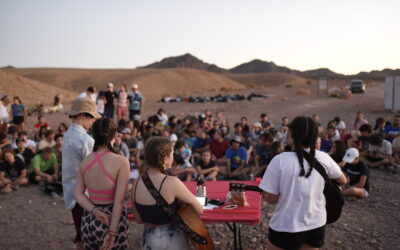By Rabbi Reuven Greenvald, Director of Israel Engagement, URJ
Mah Nishtanah! As Passover, we ask, “How is this night different than all other nights?”
Well, yesterday Israelis went to the ballot boxes, and today we know the outcome. One’s answer to this age-old Jewish question, as applied to today’s current events, is obviously connected to where you see the best hope for Israel’s future.
Because I am writing this piece before the elections, I best stick to topics that are more predictable in the calendar of Jews in Israel and around the world. As one popular Hebrew song says, “Behold Pesach (Passover) is coming!” This first night of the Feast of Freedom this year is Friday, April 19.
One of my favorite personal preparations is to pull out my collection of Haggadot (guides used to retell the story of the Exodus from Egypt). From those with commentaries to the traditional text to ones with revised modern texts, to the changing illustrations over the centuries, I look for what speaks to me each year, a message with its own personal, communal, and societal trends and challenges.
A special segment of my collection are Haggadot that come from the early years of the kibbutz movement, the collective settlements that played an outsized role – outsized for the percentage of the overall Jewish population in the pre-State era it represented – in the Zionist movement that led to the founding of the State of Israel in 1949.
The founders of the overwhelming majority of the kibbutzim embraced secular Zionism. That secularism rejected the traditional Jewish practice associated with 2,000 years of Diaspora life and, in most cases, the religious of life of the pioneers own upbringing, and looked to the inherited texts – especially the Bible with its origins in the ancient land of Israel – for ways to recreate what they called a modern Hebrew culture.
Given the meaning of Passover, the secular kibbutz founders saw much with which to work. As agriculturalists, they could highlight the way the Torah talks about Passover as the beginning of the spring harvest without the God language. As Zionists, they knew the symbolism of the Exodus – again, without reference to a divine plan – was central to what kept the hope of returning to the Promised Land alive for millennia.
A week before Passover, I carefully remove the kibbutz Haggadot from where they sit all year in an antique bookcase with glass doors. A few of the later ones from the 1970s on were printed in pamphlets. The ones from the 1930s to the 1950s were made by typing and drawing on stencil paper and reproduced by mimeograph machines on colored paper.
For the secular kibbutzniks each section of the seder – the order of the Passover meal – became an opportunity to recast ancient rituals with modern symbolism. That impulse is particularly crystalized in the reformulation of the Four Questions. The questions they invented expressed ideas about living on a collective, the challenges of Zionist settlement, and the state of Jewish life around the world.
Here are a few of the most telling examples.
In 1939, Kibbutz Shamir’s first question was:
“How is this night different from all other nights? For on all other nights we have general meetings without order (seder), on this night we have order (seder) and no general meeting.”
The questions of Kibbutz Na’an (1942) articulate the collective’s Zionism and socialism. Its text begins with a simple question about kibbutz life and then asks more difficult questions about the state of the world and the future of their kibbutz:
How is this night different from all other nights? On all other nights the children eat in their own dining hall, on this night we all recline together – parents, children, and members.
Why is the state of Jews so different from the state of other peoples? For all other peoples dwell in their home and homeland, and the Jews are scattered across the world despised and persecuted, and even to the Land of Israel they won’t let them come without trouble.
Why in the world are there rich and poor, those satisfied [with food and resources] and those who are hungry and without work, why are people at war with one another instead of helping the other and together becoming happy and content?
When will the day come when Kibbutz Na’an will be big, beautiful and expansive, with lots of land around it, and many brothers will come to it from the exile, building together with all members?
Two years after the establishment of the State of Israel, Kibbutz Gvaram (1950) asks these four simple, poignant questions:
Why is this night different from all other nights?
When will the exiles return to Israel?
Why do we have to use weapons?
When will peace take hold in our land and in all the world?
Kibbutzim have come a long way from their socialist beginnings. Today, they are mostly privatized, but their founding values and questions are not merely relics of the past; they have a role to play in questions we ask today about a sustainable future for Israel and the Jewish people.
This post originally appeared on April 9, 2019 on reformjudaism.org and can be viewed here.

